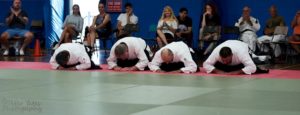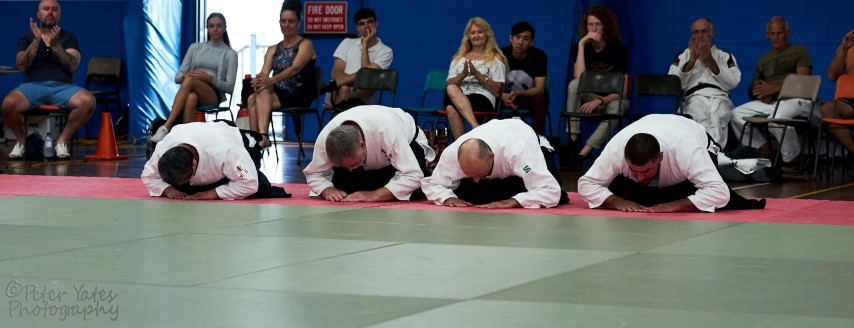What is the Rei of Budo?

Rei of Budo
The Dojo etiquette of “Rei” is an essential aspect with respect to the spirit of Budo. It is only by the expression of a sincere attitude to your opponent when training, can we provide a discrete but constant reminder of the true meaning behind our training.
The spirit of Budo can certainly be expressed through the method and particular nature of etiquette within the dojo. It is very important to establish the correct mental attitude towards others when practicing Daito-ryu. The key reason is to remind us that the training we are involved in is not a competition, nor a contest or game or to kill the enemy but a way to stop the fight.
The Daito-ryu style is physically dangerous and this must never be taken for granted. We must not allow others to misunderstand our intentions or have our actions be misinterpreted. This is particularly so during training with your partner when the application of the technique can cause some degree of discomfort.
We must constantly remind others and ourselves of the serious nature of practice, by applying correct etiquette at all times. Our body language, the words we speak, our unspoken attitude, the very act of performing etiquette naturally and willingly without conscious restrictions is the tangible evidence and expression of our true worth in the martial way.
The Japanese concept of Rei presents unique difficulties in translation. Rei may be translated in the English Language as etiquette, decorum, propriety, politeness, or courtesy. None of these terms are quite equivalent to the Japanese meaning and in particular to the context of Budo, so in this paper I will not endeavor to provide an English substitute. Think of it as the proper essence or quality of relationship between individuals.
I believe that it can be said that at the heart of Budo is Rei. The responsibility of a teacher is to communicate this to your students. If this communication fails, students can develop incorrect attitudes and the true meaning of training is lost.
The instructor ideally behaves as an exemplar, to lead students toward something higher. Rei is an expression of humility towards that higher existence. But some people, as they develop their skills and achieve higher rank, dismiss what they ought to have learned about Rei. Those who fail to work as diligently to improve the spirit as they do to improve their techniques are likely to forget the proper humility of true Rei. They are apt to become overconfident, proud, and patronizing. Spiritual development and technical development are entirely different aspects and there is not necessarily any relationship between them.
Daito-ryu training has a wonderful quality because it can result in both types of development; spiritual growth leads to technical growth and vice versa. Development is not merely a matter of technique. However, if physical techniques are taught improperly or superficially, students will become confused. There will be even greater misunderstanding if the focus is only on the process of polishing techniques. We must never lose sight of the intent to “correct and improve the spirit.” This is why an understanding of Rei is so essential to the process of spiritual growth in Budo.
One of the most profound expressions of Rei lies in the interaction between Uke, the one who receives the technique, and Tori, the one who does the technique.
When an outsider views waza training, it appears that uke loses and tori wins, this is intentional. But there’s much more to it than that, as mentioned earlier the techniques are not a contest in the traditional perception. Uke harmonizes with tori by providing a true attack; this allows tori to learn correct body displacement, combative distancing, proper spirit, and the perception of opportunity. A humble spirit is as necessary as correct technique for uke. Deceit, arrogance and a patronizing attitude must never be allowed in practice. Uke’s mission is vital. Without the true understanding of Rei this is not possible.
Uke must provide an example of clean, precise lines of atemi and correct targeting, and must also convey focused intensity and an air of true intent. Tori’s goal is to acquire the skills presented by uke’s technique.
Unfortunately, some students act as though they want to test their skills against those of the higher-ranked uke’s. They consider this competition to be their practice. In fact, this leads to neither better technique, nor greater spiritual development, because the correct relationship between uke and tori has been obscured. They have not understood the true meaning of Rei in the Budo context. It is the repetition of the appropriate techniques in this senior/junior relationship that allows for the proper growth of the spirit through the practice of technique.
Waza must be practiced so that students learn both to give and to receive. This is what makes technical improvement and spiritual development possible, when undertaken with application of Rei in a Budo context.
There is no way to transmit the waza of the Daito-ryu without a proper understanding of this reciprocal spirit of giving and receiving. It is not right for seniors in the uke role to mistreat, bully, or torment their juniors. On the contrary, their job is to guide and educate. In the same sense, it is also terrible to see tori assume an attitude that is essentially malicious, and attempt to destroy the uke. I can only say that such a spirit should never exist. Uke teaches tori by sacrificing himself, training as if he is going to be killed at any moment; this self-sacrifice embodies the spirit of teaching through rei. Waza training is of no use without understanding this. It is this spirit that allows tori to develop personally and refine his or her own spirit.
Waza teaches neither victory nor defeat, but rather how to nurture others and raise them to a higher level. This is the true Rei of Budo.
Author: Dicker Sensei


Comments are closed